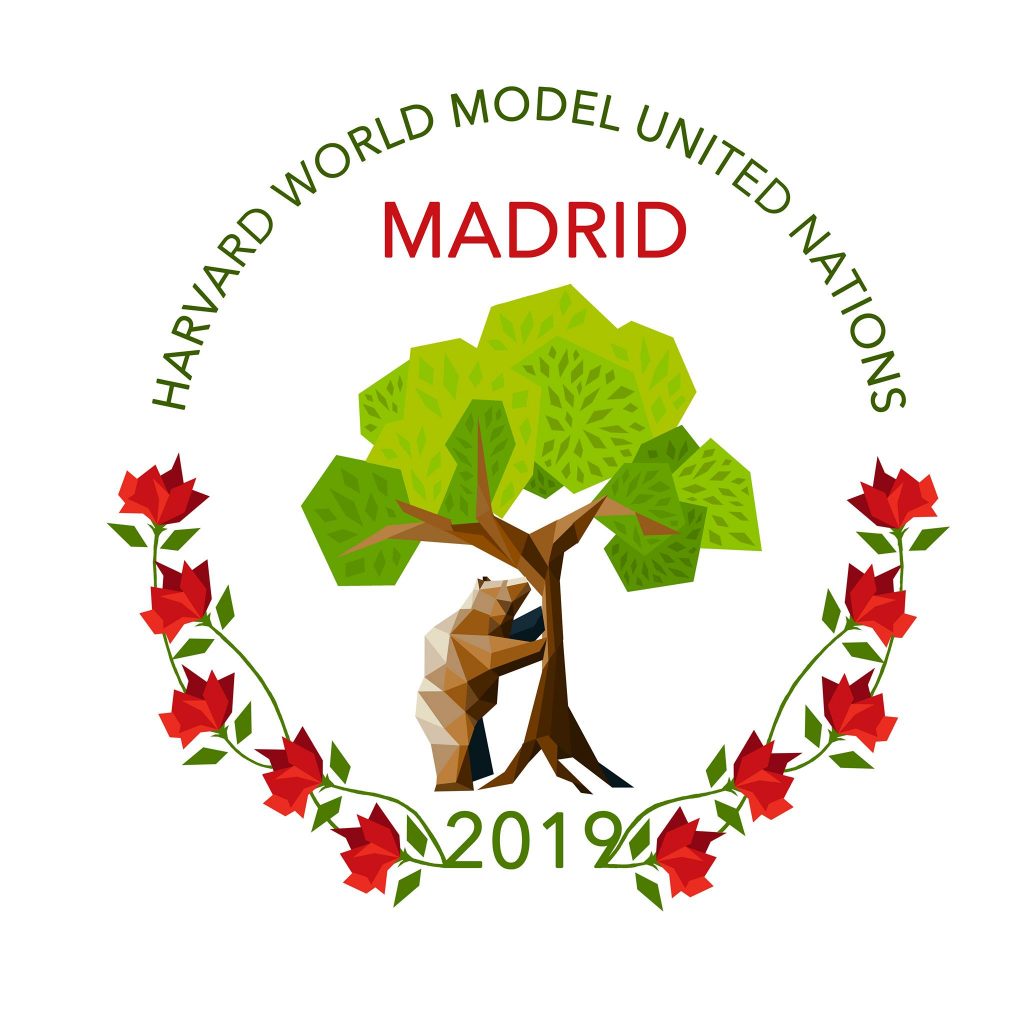Oct. 15, 2019
Neither Taylor Lambrigger nor Cézanne Rahner has set foot in the Kingdom of Cambodia.
Yet, both NAU alumnae represented the south Asian nation at an international conference earlier this year, arguing passionately on behalf of the Cambodian people, looking for compromises with other countries to help Cambodia both come to terms with and move past its history, a task that is hard to describe.
In fact, the whole experience—known as World Model United Nations, which in 2019 took place in Madrid, Spain—was one the students say should be experienced more than described. This is why every year, political science principal lecturer Gretchen Gee leads a team of NAU students to another part of the world, allowing them to spend a week with peers from around the globe, discussing difficult real-world issues and building relationships that cross borders. These students represent a variety of majors and career aspirations; some have traveled the world while others have never left the country.
It’s almost unparalleled in the opportunities it provides, Gee said.
“This is an opportunity not just to travel as a tourist to another country, but an opportunity to really engage intellectually as well as personally with some of the big issues of the world,” Gee said. “At these conferences, we’re talking about things like how to alleviate poverty, how to help countries best develop, how to help other countries overcome historical trauma.
“Students get to engage in that, not just at an intellectual level but in this personal level in the sense of investing themselves as though they are one of these countries. It’s really firsthand, experiential learning.”
What makes this opportunity possible, when so many other international experiences are out of reach for many students, is generous NAU donors who help fund the trip. For NAU alumni Roy and Delores Morey (‘59), who endow the trip every year, those students are precisely their motivation.
“I served for 22 years as a senior officer in the United Nations,” Roy Morey said. “It was only natural that Delores and I would be interested in establishing an endowment to help support students from families of limited means who may not be able to travel to the competitions.”
What is World Model UN?
World Model United Nations is an opportunity for students throughout the world; universities send teams to a Harvard-sponsored conference, where students spend a week in committee meetings, discussing issues like genocide, immigration, humanitarian rights and press freedom—real-world, thorny issues that world leaders discuss and debate every day. The students are assigned to represent a specific country and appointed to a committee.
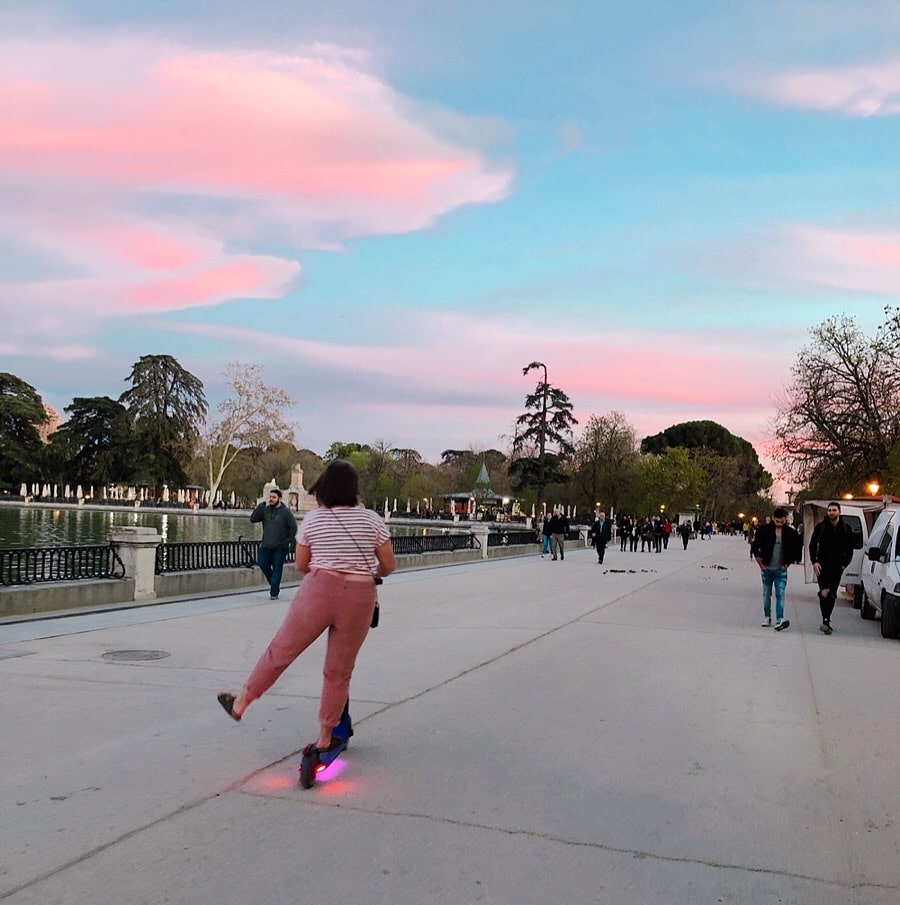
Once at the conference, students spend the week meeting with their committees, going through the issue at hand, debating possible solutions and trying to pick their way through the competing demands of different countries, having similar conversations to those of world leaders and diplomats today.
“It’s a picture of active learning,” Gee said. “You are actively engaged in taking the knowledge that you’ve got, actively arguing the point of your country, and then you have to be listening to all the countries that are talking because part of Model UN is looking for other countries that could be possible allies, finding them and working together to create negotiations and actually write resolutions that you’re going to try to get passed by the entire committee.”
Gee pointed to a debate during the 2019 World MUN conference in Madrid about the refugee crisis. Students representing Libya, a sending country, sat on a committee with Italy, a receiving country. Their conflicting needs required hard conversations about a problem everyone sees but to which no one sees a workable solution. Students come away with an understanding of just how difficult such problems are to solve.
While at the conference, students mingle with their peers, build relationships, learn about their host country and hear from world leaders. In Madrid, Felipe VI, the king of Spain, was the keynote speaker.
This is a different club than Model UN, though the two frequently overlap; in fact, both Rahner and Lambrigger came to World MUN through participation in Model UN. The World MUN team, which requires an application, meet throughout the spring semester to prepare, but the annual international conference, held each year during spring break, is their one big event.
What benefits do students see?
The program has dual purposes: help students develop skills that will aid them in careers, leadership positions, further education and wherever else they end up in their lives; and help foster a global community with mutual respect and understanding, requiring the students to not only get to know students from dozens of other countries, but also to consider international issues from a perspective that is not their own.
For Rahner and Lambrigger, that meant months of researching Cambodia’s history, including the genocide of the 1970s, when the Khmer Rouge regime executed about 2 million of its own citizens, and how the country has dealt with that since, both from a legal standpoint and also how society has been shaped.
It’s easy to see how some of those skills—debate, public speaking, problem-solving—fit into World MUN and how easily transferrable they are to careers. But don’t think it’s only valuable for budding politicians and diplomats and motivational speakers. Lambrigger, who graduated in May with a double major in anthropology and biology and participated in undergraduate research in forensics during her time at NAU, found an immediate connection to her career goals.
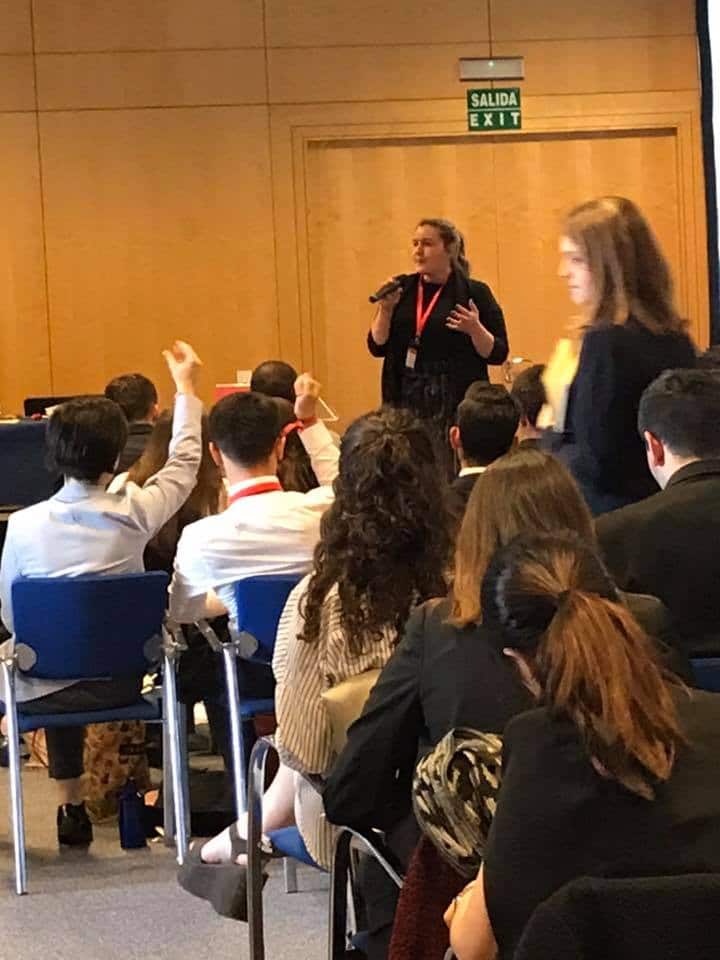
“I hope to help with mass grave exhumation from recent genocides and repatriation of those remains back to communities,” she said. “The committee I was placed in at World MUN focused on post-genocide reconstruction, which was directly in line with my academic and professional interests. Being able to meld those interests with a conference that encouraged creative thinking and multicultural perspectives and travel was a once-in-a-lifetime opportunity.”
Rahner, who majored in political science and Spanish, directly connected skills from the classroom into her experience at the conference, all of which will inform her future as a lawyer. But those with perhaps less traditional majors should check it out as well, she said.
“Every skill you learn at conferences, from public speaking to analyzing policy proposals to debate and compromise can be applied to diverse future endeavors,” Rahner said. “If I wanted to be a marine biologist or a middle school teacher, I could find a way to use the skills fostered at World MUN.”
Rahner was on the Special Political and Decolonization Committee; she spent the week discussing the rights and protections of secessionist states. The committee touched on democracy building, post-colonialism, cultural and political self-actualization and the proper role of the United Nations. She found herself presenting positions that were at odds with other members’ positions and finding unusual connections to make sure her voice—Cambodia’s voice—was heard.
It’s a busy, tiring and at times an overwhelming week, so in between committee meetings and networking and learning more about the UN and international affairs, students took the time to explore their host cities, experience local culture and sample the cuisine. Rahner talked about seeing original Picassos at the Reina Sofía, riding scooters through El Parque Retiro at sunset and “sampling ridiculously bougie paella.”
The students also get a little time off, so Gee arranges day trips to nearby cities. In Spain, they went to the ancient city of Toledo; exploring it was one of the highlights of Lambrigger’s week. At the 2020 World MUN conference in Tokyo, Japan, the delegation will take a high-speed train to Hakone, near Mount Fuji.
How have donors made this possible?
TheMoreys’ endowment is sufficient to cover the team’s housing each year, which takes a huge chunk out of the total cost for each student. From there, the students turn to other funding sources like ASNAU, the Center for International Education, Dean Karen Pugliesi’s office and the Office of Undergraduate Research to pay for registration fees, plane tickets and food. Typically, students also pitch in their own money. Gee likes that they do the work for this funding themselves, but she never wants the students ponying up the majority of the money out of their bank accounts.
“We’re a university filled with first-generation kids; we’re a university filled with kids who are working their way through school and taking out student loans,” she said. “I am so passionate about not making this a trip for kids who just happen to come from wealthier backgrounds. I really want this to be a trip that kids from modest backgrounds can also take part in.”
Roy and Delores Morey said they both came from families with limited means, but tuition and the cost of living in the 1950s were low enough that they could work during the summers and live off those earnings the rest of the year. As state investment decreased and other costs increased, they saw students struggling more than they had. They also realized that many students, concerned with tuition, rent and food costs, didn’t even consider taking on additional opportunities that would expand their horizons but also add to their expenses.
“We started by endowing a Washington internship for a student to spend either a semester or a summer working in a congressional office,” Delores Morey said. “We then became very impressed with the success of the NAU Model UN team and the high quality of its members, so now that is our second endowment.”
The donations made a huge difference for Lambrigger, who worked three part-time jobs throughout college to pay for living expenses while ensuring she kept her grades up so she could keep her scholarship. Paying for this trip herself would have been out of the question.
“To go to Spain for a week as a college student in many situations is unheard of, so the fact that six of us got to go and live in Madrid for less than $200 each is truly a gift, and I can safely say on behalf of all six of us that we are incredibly grateful for the donations and gifts that made it happen,” she said.
Cultivating donor relationships to help support the student experience has been a top priority for Pugliesi, whose office also kicked in funding for the team to go to Spain.
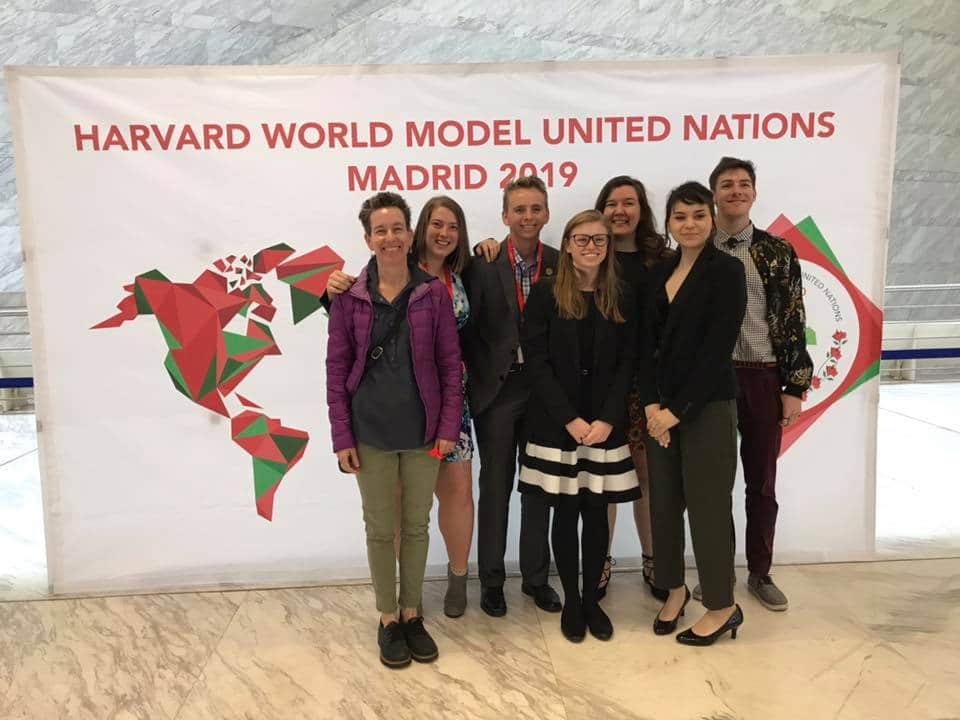
“The Model UN is an award-winning academic team through which students learn about political systems, international relations and the issues impacting nations around the world,” she said. “The generous support of our donors enables us to send the NAU Model UN team to domestic and international competitions. Without philanthropic gifts, our team would not have achieved national ranking, placing among the top 75 teams in the U.S.”
For the Moreys, it’s about paying back what NAU gave them and an opportunity to help future generations of Lumberjacks.
“NAU was very good to us and provided us with an education that we used as a stepping stone to achieve a successful and rewarding life,” Roy Morey said. “We are certain that there are thousands of NAU alumni who can say exactly the same thing, and we would encourage them to give back. It is the best legacy anyone can leave.”
Interested in donating to help fund the team to go to Tokyo in 2020? Visit the NAU Foundation website and enter fund No. 5291 (Model United Nations) or explore the hundreds of other giving opportunities available through the Foundation.
Who should apply for World Model UN?
Interested students don’t need to be good public speakers or debaters when they apply, but they need to be willing to learn how to research and engage with ideas and get comfortable speaking in public, Gee said. But she doesn’t want that to scare anyone.
“They don’t have to be great public speakers,” she said. “I like having kids who aren’t great public speakers to start with because I see this as an opportunity to grow, to learn how to be a better public speaker, to learn how to advocate as well as listen.”
That enthusiasm and desire to learn and grow is the No. 1 factor Gee wants in World MUN representatives from NAU. She’s far less concerned with majors—and in today’s global economy, students in any major can find value in such an international experience—and students don’t need to speak another language or have any travel experience. Gee recalled one student who comes to mind for success at World MUN; he’d never left the country before the conference in Brussels, Belgium. Gee roved between committees during the week, hoping to catch students in action, and happened to step into this room just as her student began to speak.
“To see him go stand up at the front and so eloquently defend his position was just so heartwarming,” she said.
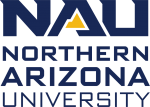
Heidi Toth | NAU Communications
(928) 523-8737 | heidi.toth@nau.edu
